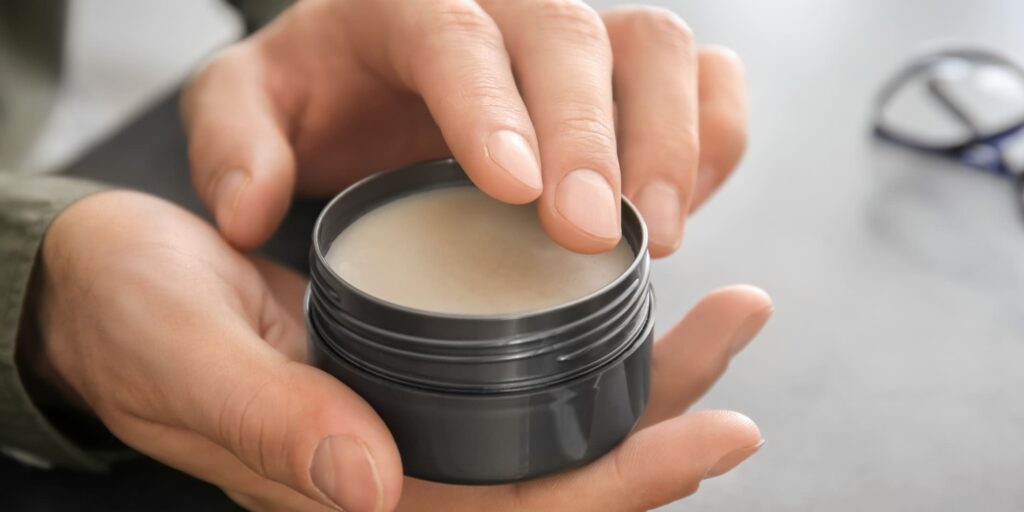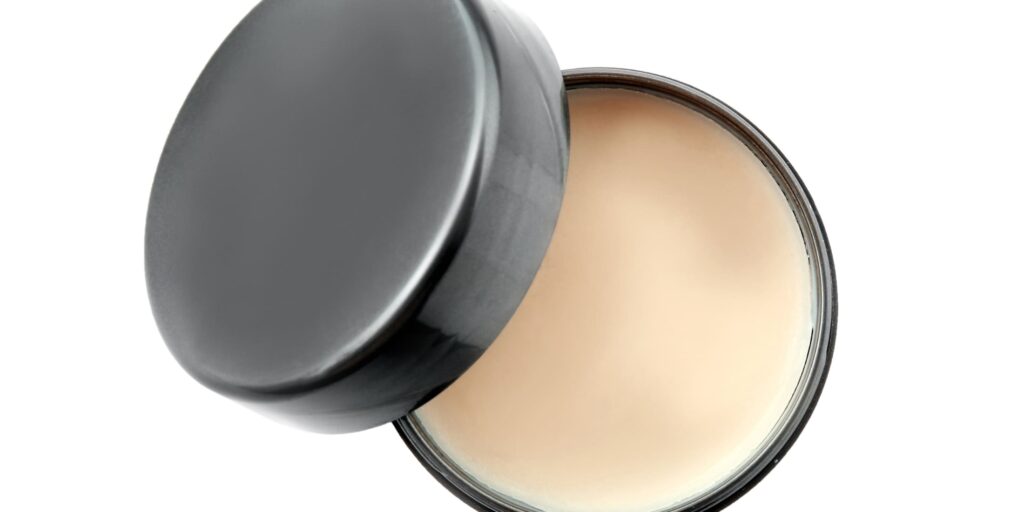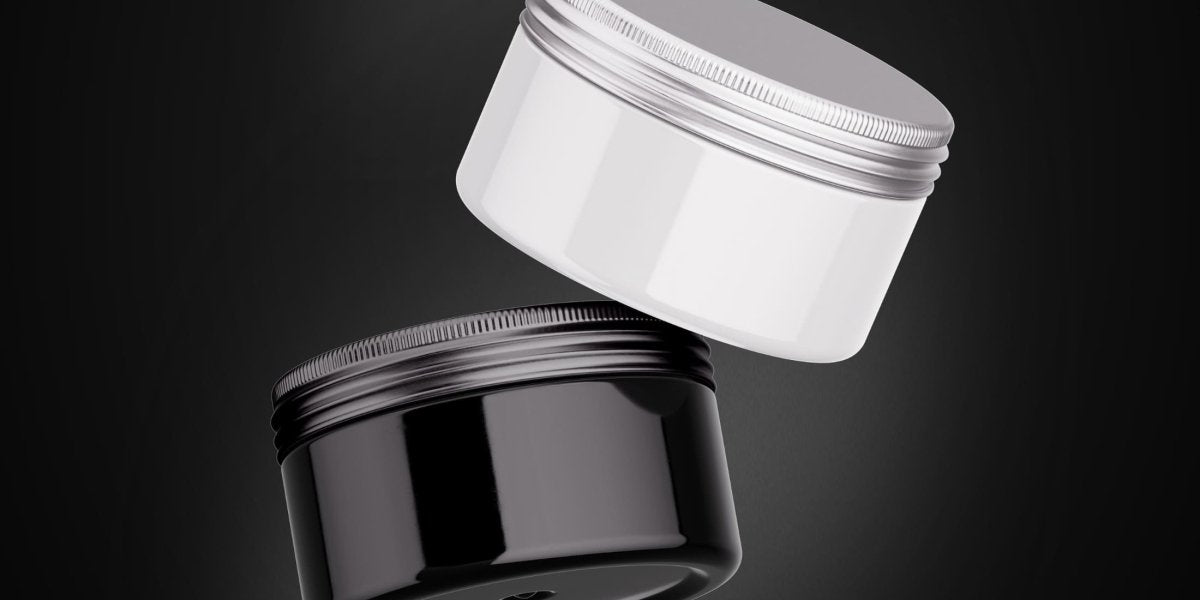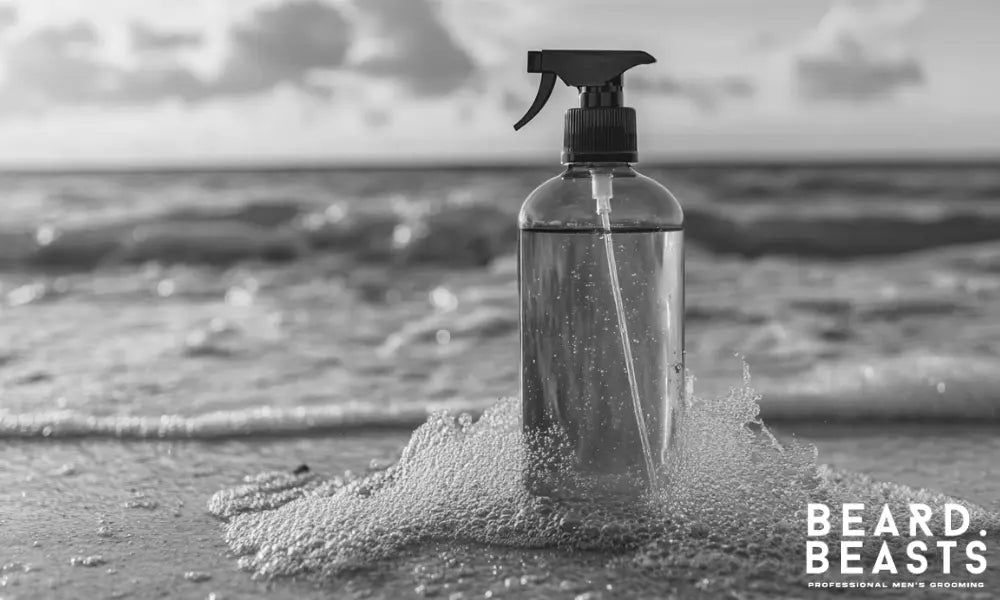In the pomade vs wax vs clay debate, it’s essential to understand what each product offers and how it can help you achieve your desired hairstyle. Whether you’re aiming for a slicked-back look, a textured and messy style, or a natural, voluminous finish, there’s a product that fits your needs.
This guide will walk you through the benefits, drawbacks, and best uses for pomade, wax, and clay, helping you make an informed decision. By the end, you’ll know exactly which product to reach for to keep your hair looking its best.
What is Pomade?
Pomade is a hairstyling product that has been a staple in men’s grooming for decades. Known for its ability to provide a sleek, polished look, pomade is perfect for those aiming for classic hairstyles.

Types of Pomade
Pomades come in two main types: oil-based and water-based.
1. Oil-Based Pomade:
- Ingredients: Contains petroleum or mineral oil.
- Hold and Shine: Offers a strong hold with high shine.
- Longevity: Long-lasting and can withstand humidity.
- Drawback: Can be difficult to wash out, often requiring multiple washes.
2. Water-Based Pomade:
- Ingredients: Primarily water-based with other styling agents.
- Hold and Shine: Provides a flexible hold with varying degrees of shine.
- Washability: Easy to wash out with just water.
- Drawback: May not last as long in humid conditions compared to oil-based pomades.
| Feature | Oil-Based Pomade | Water-Based Pomade |
|---|---|---|
| Hold | Strong | Flexible |
| Shine | High | Variable (matte to high) |
| Washability | Difficult | Easy |
| Longevity | Long-lasting | Moderate |
| Best for | Classic, slick styles | Versatile styles |
Benefits of Pomade
Pomade is a favorite among hairstyling products for several reasons:
- Long-Lasting Hold: Pomade can keep your hair in place all day, making it ideal for structured hairstyles.
- High Shine: If you’re aiming for a glossy, polished finish, pomade is the way to go.
- Suitable for Classic Hairstyles: Think pompadours, slick backs, and side parts – pomade is perfect for achieving these timeless looks.
Drawbacks of Pomade
While pomade has its perks, there are a few downsides to consider:
- Can Be Greasy: Especially the oil-based variety, which can leave your hair feeling heavy and oily.
- Difficult to Wash Out: Oil-based pomades can be stubborn, requiring a strong shampoo or even a specialized product to remove.
Best For
Pomade is best suited for:
- Hair Types: Medium to thick hair types that can handle the weight of the product.
- Hairstyles:
- Slicked-back styles
- Pompadours
- Side parts
- Quiffs
In the debate of pomade vs wax vs clay, pomade stands out for its ability to deliver a shiny, slick look with strong hold, especially for classic hairstyles. It’s a go-to product for those wanting a polished finish, but be prepared for the extra effort required to wash it out if you choose an oil-based variant.
Key Takeaway: If you’re after a sleek, classic style with a glossy finish, pomade might be your best bet. Just remember to choose between oil-based and water-based pomade depending on your preference for hold, shine, and ease of washing out.
What is Wax?
Hair wax is a versatile styling product that provides a natural, matte finish while offering flexible hold. Unlike pomade, waxes are typically less greasy and more pliable, making them a popular choice for modern hairstyles that require texture and movement.

Benefits of Wax
Hair wax has a variety of benefits that make it a go-to product for many:
- Flexible Hold: Wax provides a hold that keeps your hair in place while allowing for movement and natural-looking styles.
- Matte to Low Shine: Perfect for achieving a natural look, waxes range from completely matte to a subtle, low shine.
- Restylable Throughout the Day: One of the biggest advantages of wax is its ability to be restyled. You can reshape your hair throughout the day without needing to add more product.
Drawbacks of Wax
While hair wax is highly versatile, it does come with a few drawbacks:
- Can Be Difficult to Wash Out: Depending on the ingredients, some waxes can be challenging to remove completely with just one wash.
- May Cause Buildup: Regular use without proper cleansing can lead to product buildup, which might weigh down your hair or cause scalp issues.
Best For
Hair wax is especially well-suited for:
- Hair Types: Fine to medium hair that benefits from added texture and volume.
- Hairstyles:
- Textured, messy looks
- Spiky styles
- Short to medium-length haircuts
- Quiffs and faux hawks
| Feature | Hair Wax |
|---|---|
| Hold | Flexible |
| Shine | Matte to low shine |
| Washability | Moderate |
| Restylability | High |
| Best for | Textured, messy styles |
Key Takeaway: Hair wax is your best bet if you want a product that offers flexibility and a natural look. It’s great for textured, messy styles and allows for restyling throughout the day. Just be mindful of potential buildup and the need for thorough washing.
This section, combined with the detailed analysis of pomade, provides a clearer picture in the pomade vs wax vs clay debate, helping you choose the right product for your hair type and styling needs.
What is Clay?
Hair clay is a styling product that offers strong hold and a matte finish, making it ideal for achieving natural, voluminous looks. It typically contains natural clays like bentonite or kaolin, which help to absorb oil and add texture.
Benefits of Clay
Hair clay comes with several benefits that make it a popular choice for those seeking a more natural look:
- Strong Hold: Clay provides a strong, pliable hold that keeps your hair in place without making it stiff.
- Matte Finish: Perfect for a natural, non-greasy appearance, clay leaves a matte finish.
- Adds Volume and Texture: Clay helps to add volume and texture, making it great for those with fine or thinning hair.
Drawbacks of Clay
Despite its many benefits, hair clay also has a few drawbacks to consider:
- Can Be Drying: The absorbent nature of clay can sometimes strip moisture from your hair, making it feel dry.
- Might Be Harder to Distribute Evenly: Due to its thicker consistency, clay can be a bit challenging to spread evenly through your hair.
Best For
Hair clay is especially well-suited for:
- Hair Types: Fine to medium hair that needs extra volume and texture.
- Hairstyles:
- Natural, voluminous looks
- Messy, textured styles
- Short to medium-length haircuts
- Structured but pliable styles
| Feature | Hair Clay |
|---|---|
| Hold | Strong |
| Shine | Matte |
| Volume | Adds volume and texture |
| Dryness | Can be drying |
| Distribution | Might be harder to distribute evenly |
| Best for | Voluminous, natural styles |
Key Takeaway: Hair clay is your best bet if you want a product that provides a strong hold, adds volume, and leaves a natural matte finish. It’s perfect for creating textured, voluminous styles, especially for those with fine or medium hair. Just be mindful of its drying nature and take care to distribute it evenly.
This section, along with the previous ones on pomade and wax, helps you make an informed decision in the pomade vs wax vs clay debate, ensuring you choose the right product for your hair type and desired style.
Comparison: Pomade vs Wax vs Clay
When deciding between pomade, wax, and clay, it’s important to understand how each product performs in different areas. Here’s a detailed comparison to help you choose the right product for your hair type and styling needs.
Hold and Shine
Pomade:
- Hold: Strong
- Shine: High (especially oil-based); Moderate (water-based)
Wax:
- Hold: Flexible
- Shine: Matte to low shine
Clay:
- Hold: Strong
- Shine: Matte
Application and Washability
Pomade:
- Application: Smooth and easy to apply.
- Washability:
- Oil-based: Difficult, requires multiple washes.
- Water-based: Easy, rinses out with water.
Wax:
- Application: Moderate, can be a bit sticky.
- Washability: Moderate, may require a couple of washes to remove completely.
Clay:
- Application: Can be thicker and harder to distribute evenly.
- Washability: Moderate to easy, depending on the product.
Hair Types and Styles
Pomade:
- Best for Hair Types: Medium to thick
- Best for Styles:
- Slicked-back styles
- Pompadours
- Side parts
Wax:
- Best for Hair Types: Fine to medium
- Best for Styles:
- Textured, messy looks
- Spiky styles
- Quiffs and faux hawks
Clay:
- Best for Hair Types: Fine to medium, especially thinning hair
- Best for Styles:
- Natural, voluminous looks
- Messy, textured styles
- Structured but pliable styles
Versatility and Restyling
Pomade:
- Versatility: Good for classic, structured styles.
- Restyling:
- Oil-based: Low, once set it’s hard to restyle.
- Water-based: Moderate, can be restyled with a bit of water.
Wax:
- Versatility: Highly versatile for various textured styles.
- Restyling: High, easy to restyle throughout the day.
Clay:
- Versatility: Great for natural, voluminous styles.
- Restyling: Moderate, can be reshaped but may need a bit of water.
Key Takeaways
- Pomade: Best for achieving a polished, classic look with high shine and strong hold. Choose oil-based for long-lasting styles and water-based for easier washability.
- Wax: Ideal for flexible, textured styles with a natural finish. Easy to restyle throughout the day, making it perfect for those who like to change up their look.
- Clay: Perfect for creating voluminous, matte-finish styles. Offers strong hold and adds texture, particularly good for fine or thinning hair.
In the pomade vs wax vs clay debate, consider your hair type, desired style, and how often you want to restyle throughout the day. Each product has its unique benefits and drawbacks, so choose the one that best fits your needs for the perfect hairstyle.
How to Choose the Right Product for You
Selecting the right hair styling product can be tricky, but with a little guidance, you can find the perfect match for your hair type, desired style, and lifestyle. Let’s break it down!
Hair Type Consideration
The first step in choosing between pomade, wax, and clay is understanding your hair type. Different products work better with specific hair textures and thicknesses.
- Fine Hair:
- Best Product: Clay
- Why: Adds volume and texture without weighing hair down.
- Thick Hair:
- Best Product: Pomade
- Why: Provides strong hold and can tame thick hair into slick, polished styles.
- Curly Hair:
- Best Product: Wax
- Why: Offers flexible hold that can define curls without making them crunchy.
| Hair Type | Best Product | Why |
|---|---|---|
| Fine | Clay | Adds volume and texture |
| Thick | Pomade | Provides strong hold and control |
| Curly | Wax | Defines curls with flexible hold |
Desired Style
Next, consider the hairstyle you want to achieve. Each product excels in creating different looks.
- Slicked Back:
- Best Product: Pomade
- Why: Offers high shine and strong hold for a sleek appearance.
- Textured and Messy:
- Best Product: Wax
- Why: Provides a natural finish and flexible hold for a tousled look.
- Spiky:
- Best Product: Clay
- Why: Delivers strong hold and matte finish, perfect for spiky styles.
| Desired Style | Best Product | Why |
|---|---|---|
| Slicked Back | Pomade | High shine and strong hold |
| Textured and Messy | Wax | Natural finish and flexible hold |
| Spiky | Clay | Strong hold and matte finish |
Lifestyle Factors
Your daily routine and lifestyle also play a crucial role in selecting the right product. Consider these factors:
Ease of Use:
- Pomade: Easy to apply, especially water-based versions.
- Wax: Moderate, slightly sticky but manageable.
- Clay: Can be thicker, requires a bit more effort to distribute.
Frequency of Restyling:
- Pomade: Low to moderate (water-based pomades can be restyled with water).
- Wax: High, very easy to restyle throughout the day.
- Clay: Moderate, can be reshaped but may need a bit of water.
Washability:
- Pomade: Difficult (oil-based), Easy (water-based).
- Wax: Moderate, may need a couple of washes.
- Clay: Moderate to easy, depending on the product.
| Lifestyle Factor | Pomade | Wax | Clay |
|---|---|---|---|
| Ease of Use | Easy (water-based) | Moderate | Thicker, requires effort |
| Restyling | Low to moderate | High | Moderate |
| Washability | Difficult (oil-based), Easy (water-based) | Moderate | Moderate to easy |
Key Takeaway
Choosing the right product in the pomade vs wax vs clay debate comes down to matching your hair type, desired style, and lifestyle needs:
- Pomade is best for those with thick hair or looking to achieve a slick, polished look.
- Wax is ideal for those who prefer a flexible, natural finish and need to restyle throughout the day.
- Clay works great for adding volume and texture to fine hair, with a strong hold and matte finish.
By considering these factors, you can confidently select the perfect product to keep your hair looking its best every day.
Concluding The Pomade vs Wax vs Clay Debate
Choosing the right hair product can make all the difference in achieving your desired hairstyle. Whether you prefer pomade, wax, or clay, each product offers unique benefits tailored to different hair types, styles, and lifestyles.
Quick Recap:
Pomade:
- Best For: Thick hair, slicked-back styles, and high-shine finishes.
- Pros: Strong hold, high shine.
- Cons: Can be greasy, difficult to wash out (oil-based).
Wax:
- Best For: Fine to medium hair, textured and messy styles, restyling flexibility.
- Pros: Flexible hold, matte to low shine, easy restyling.
- Cons: Moderate washability, potential buildup.
Clay:
- Best For: Fine to medium hair, voluminous and natural looks, matte finish.
- Pros: Strong hold, adds volume and texture, matte finish.
- Cons: Can be drying, harder to distribute.
Final Thoughts:
- Evaluate Your Hair Type: Choose clay for fine hair needing volume, pomade for thick hair requiring control, and wax for versatility.
- Consider Your Desired Style: Match your product to your look—pomade for slick, wax for textured, and clay for volume.
- Factor in Your Lifestyle: Think about how easy it is to apply and wash out, and how often you restyle during the day.
By understanding the strengths and drawbacks of each product in the pomade vs wax vs clay debate, you can make an informed decision that suits your hair type, desired style, and lifestyle.
Feel free to experiment with different products and find what works best for you. Hair styling is as much about personal preference as it is about product performance. Enjoy the journey of discovering your perfect hair care routine!





